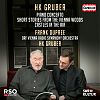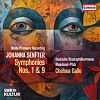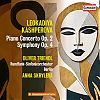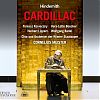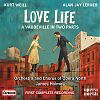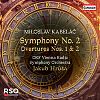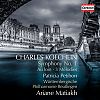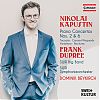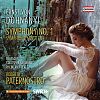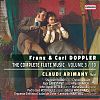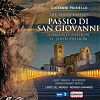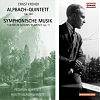cd

ZYGMUNT STOJOWSKI (1870-1946)
DEUTSCHE STAATSPHILHARMONIE RHEINLAND-PFALZ · ANTONI WIT
Suite für Orchester Es-Dur op. 9 (1891)
Suite for Orchestra in E flat major, Op. 9
(Hommage à Hans von Bülow)
DEUTSCHE STAATSPHILHARMONIE RHEINLAND-PFALZ
ANTONI WIT, Dirigent / conductor
Hörprobe
Weitere Bilder

JENÖ TAKÁCS
Oliver Triendl · Nina Kamon · Georgian Chamber Orchestra Ingolstadt · Evan-Alexis Christ
JENÖ TAKÁCS (1902-2005)
Serenade after ancient Contredanses from Graz, Op. 83b for strings
Rhapsody for violin and strings, Op. 49a 'Hungarian Tunes'
Concerto for piano, strings and percussion, Op. 60
Passacaglia for strings, Op. 73
Three Pieces for Strings (1993)
NINA KARMON, Violine / violin· OLIVER TRIENDL, Klavier / piano
GEORGIAN CHAMBER ORCHESTRA INGOLSTADT
EVAN-ALEXIS CHRIST, Dirigent / conductor
His works have accompanied generations of beginner instrumental students on their first foray into contemporary music. But also with his works like the Concerto for Piano, Strings, and Percussion Jenö Takács clearly placed himself in a line with the great paragons Béla Bartók and Zoltán Kodály. Getting to know Bártok further increased the Hungarian element (topicality, rhythm, bitonality) in his compositions. With the impressionist coloring and the influences of Hungarian folk music studying with Joseph Marx added a strict contrapuntal note to his works. Jenö Takács was a humanist, a ‘musical cosmopolitan’, an eyewitness of almost the entire 20th century.
Hörprobe
Weitere Bilder

PANCHO VLADIGEROV: ORCHESTRAL WORKS · 3
BULGARIAN NATIONAL RADIO SYMPHONY ORCHESTRA · ALEXANDER VLADIGEROV
COMPACT DISC 1
"Ljulin" Impressionen - Suite für grosses Orchester op. 63 (1972)
'Lyulin' Impressions - Suite for large orchestra, Op. 63
Jüdisches Poem / Jewish Poem, Op. 47 (1949)
Sechs symphonische Novelletten Op. 59/60 (1964/65)
Six Symphonic Novelettes. op. 59/60
Dramatisches Poem, Op. 52 / Dramatic Poem, op. 52 (1956)
COMPACT DISC 2
Sechs exotische Präludien, op.17 / Six Exotic Préludes, Op. 17 (1924)
Drei konzertante Stücke, op. 57 / Three Concert Pieces, Op. 57 (1959/60)
Improvisation und Toccata für Orchester, op. 36a (1941/42)
Improvisation and Toccata for Orchestra, Op. 36a
COMPACT DISC 3
Drei Impressionen für Orchester, op.9 (1920)
Three Impressions for Orchestra, Op. 9
’’Einsamkeit’’ / 'Solitude' – Prelude op. 10 Nr. 3 (1929/56)
Drei Stücke für Streichorchester / Three pieces for string orchestra
Symphonische Legende, op. 8 / Symphonic Legend, Op. 8 (1919)
From the diversity of Bulgarian musical culture Pancho Vladigerov stands out as undoubtedly the most important composer for the musical self-conception of modern Bulgaria. As the mentor of generations of Bulgarian composers in the 20th century, up to now he has formed a salient figure in the music life of his country. Revered as a living legend, he was in a position to continue his work largely unaffected by the demands of the Communist regime, although his musical diction, based on late Romantic tradition and keynote-related tonality, would hardly have provoked any reprisals anyway. With these recordings, produced in the 1970s in Bulgaria, Capriccio releases an 18CD Vladigerov-Edition to preserve this colourful music also for the next generations.
Hörprobe
Weitere Bilder

Josef Labor
Ensemble Tris
Jörg Wachsenegger, Klarinette / clarinet
Gerhard Waiz, Violoncello / cello · Holger Busch, Klavier / piano
A total of around eighty compositions of Joseph Labor have survived. Among them are practically no occasional works, which is connected to the fact that he was blind: for him composition was a luxury, insofar as he had to rely on the help of a scribe who had to commit the work to paper. Labor’s music is very skillfully composed, always sensuous, and first and foremost melodious; it does not require a too complete concentration on itself. In Vienna, Labor was part of Johannes Brahms’s close circle of friends. This is already the third CD Release with this sensitive Chamber Music of an mostly forgotten composer.
Hörprobe
Weitere Bilder

NIKOLAI KAPUSTIN
Frank Dupree, piano · Jakob Krupp, bass · Meinhard "Obi" Jenne, drums
“Kapustin uses jazz as his musical language and then composes quasi-improvisations that sound as though they stemmed right from Oscar Peterson’s or Erroll Garner’s fingers. He is one of the few who were able to have the strictures of composition and liberty of improvisation come together to such an organic whole.” – Frank Dupree
Following his first successful release featuring the Fourth Piano Concerto and the Concerto for Violin, Piano and Strings by the Russian composer Nikolai Kapustin (Capriccio C5437), Frank Dupree presents a selection of the little-known master's works for solo piano, performed as originally written, while bassist Jakob Krupp and drummer Obi Jenne improvise around him. There is surely no better example of jazz poured so expertly into a classical mould.







